- Home
- Scott Westerfeld
Impostors Page 2
Impostors Read online
Page 2
“Doesn’t it scare you?” she asks.
I recite what our father always says. “The rebels only hate us because they’re jealous of what he’s built. That means they’re small people, not worth being afraid of.”
Rafi shakes her head. “I meant, doesn’t it scare you that you killed someone?”
The question takes a second to sink in. I’ve been too brain-rattled to think about it. The sound of the knife churning through the assassin, the taste of his blood in the air.
“In that moment, it’s not me.” My fingers flutter, moving through pulse knife commands. “It’s the training—all those hours of practice.”
She takes my hand, stills my twitching fingers. “That’s what Naya would say. But how did it feel to you?”
“Amazing,” I say, soft as air. “I’d kill anyone for you, Rafi.”
Her eyes stay locked on mine. Her lips barely move, mouthing the shadow of a word—Anyone?
My breath catches. I can’t believe that she would ask me this, even too softly for spy dust to hear. Because I know exactly who she means.
I dare to give her the barest nod.
Even him.
A smile settling on her face at last, Rafi looks away into the mirror. Those identical faces with identical scars.
“Remember back when we were littlies, and they told us it was a game? Pretending there was only one of us? None of it seemed real.”
I nod. “Like a joke we were playing on the world.”
“Some joke. It’s less funny when someone shoots at you.”
“He missed.”
She points at her scar. “Speak for yourself.”
“That wasn’t a bullet, Rafi. Just … collateral damage.”
She reaches across to touch my brow with careful fingertips. Beneath the tingle of medspray, a dull ache beats in time with my heartbeat.
“So what’s this?”
I turn away, but Rafi’s still there in the mirror.
“That’s not damage,” I say. “That’s me, always part of you.”
She squeezes my hand, and I feel that certainty I always had as a littlie. That I’m more than expendable. More than a body double.
“This isn’t normal,” she whispers. “This secret. People don’t raise their kids to take a bullet.”
“But I saved you.”
Rafi doesn’t know how amazing this feels. How those years of training, all that work and pain, flowing through me now like lightning.
She turns away for a moment.
“One day I’ll save you too.”
Naya is trying to hurt me.
She’s coming at me with a bō, a long bamboo staff with metal tips. It’s one her favorite weapons—it spins in her hands, stirring the cool air of the training room.
It’s a whole year after the assassination attempt, and there haven’t been any attacks on our family since. But they train me harder than ever.
Lately, it’s all been improvised weapons. I never go anywhere without my pulse knife, but Naya wants me ready for anything.
The weapons table is full of random junk—a handscreen, a scarf, a vase of flowers, a fireplace poker. I’m supposed to grab something to protect myself.
The poker can’t be right. Too obvious, too heavy and slow to block that wheeling staff.
The vase would shatter—and I’m barefoot. No thanks.
Scarves can strangle, bind, and trap. But I’d have to get close to use it, and the spinning bō is longer than I am tall.
So I grab the handscreen and fling it edgewise at Naya.
For a glorious moment it’s a flying blade, flashing sharp and deadly. I almost worry it’ll hurt her. But a flick of the bō shatters it into a spray of safety glass.
Naya barely squints as the shards rain past her.
I grab the vase and tip it onto the mat. Maybe I can make her slip.
But there’s no water in the vase, just dried flowers. Petals scatter, like she’s getting married.
Maybe I’m being too clever. As she closes in, I grab for the—
Whap.
The bō cracks down on the back of my hand, and agony erupts. Anatomy classes spill like fire through my head—all those nerves in the hand, laced around all those delicate bones.
The best way to take down a bigger opponent is to break a finger.
I’m sinking to my knees, clutching my wrist.
“Your turn.” Naya throws me the staff.
It clatters to the floor. The pain is fizzing up my arm, filling my head. Red sparks fly at the edge of my vision.
“Get up,” she says. “Fights don’t stop when you get hurt.”
“But I think it’s—”
“Stand and fight.” She means it.
All my trainers have been brain-missing lately. Eager to make me bleed, to break bones. But this is the first time Naya’s forced me to keep fighting after hurting me this bad.
I stagger to my feet, clutching the staff in my left hand.
“Get your weapon moving, Frey.”
I put my broken hand on the staff, and for a moment it’s too painful to think. Then I remember—all the power of the bō comes from the back hand, the front only guides the staff.
I get the weapon spinning, barely.
“Faster.”
It’s impossible, but I try anyway. If I pass out from the pain, at least this will be over.
Naya darts forward to the table, then rolls back out of reach, the scarf in her hands. She ties a quick knot at one end.
Of course—the correct answer is always the softest, fluffiest thing on the table.
She flicks the scarf into the slow gyre of my staff. It tangles, jerks the bō from my grasp. The jolt to my broken hand is so painful I almost throw up.
“The best way to blunt a force is to tangle it,” Naya says.
This was the point of today’s lesson, I suppose—a parable to make me wiser. But it’s hard to learn anything when it hurts too much to breathe.
Five minutes later, while the autodoc is knitting my metacarpals back together, our father summons me.
Naya doesn’t look surprised. Just shakes her head.
“You aren’t ready.”
I stare at her. “For what?”
“It’s not my place to tell you.”
“Are we going someplace?”
She hesitates, then nods.
“So there’s a reason for this.” I wave my good hand at the wreckage in the room. The shattered glass of the handscreen, the strewn petals, the scarf still tangled with the bamboo staff.
“There’s always a reason, Frey. Did you think we were doing this for fun?”
Fun? I almost laugh. The autodoc is making a grinding sound, like the beautiful steel contraption in my father’s office that dribbles out coffee on command. I distantly feel my bones being restitched and reshaped.
It makes me twitch.
Then it hits me—
Improvised weapons. All month long.
Wherever Rafi and I are going, I won’t be taking my knife.
Naya and I take the private elevator up—only people who know about me are allowed to use it. There are special hallways for me too, marked with red stripes for the highest-clearance members of staff.
When we were little, sometimes Rafi would hide in our room and let me wander the house. When I was dressed like her, I could go anywhere I wanted. But freedom was never reallyhappy-making, because I was always alone.
So we made up a better game. We pretended we lived in a dungeon with monsters roaming the halls. Sneaking into the nonsecure corridors, we’d spy on the staff at work, careful not to be seen.
Luckily, we got caught by Naya before anyone else. Furious, she explained what would happen to someone who saw us together, if they didn’t already know about me.
After that, the game wasn’t fun anymore.
But I miss having time for games.
My hand is wrapped in a cold-sleeve to keep the swelling down. The bones are knitted, but the t
issues deep inside feel wrong. Like always after a fresh training injury, I keep imagining something torn in there, too small for the autodoc to catch.
When the elevator arrives outside our father’s office, Rafi and her assistant are waiting. Father never sees me without my older sister in the room. Bonding too closely with his spare daughter would be sloppy.
Rafi takes in my sweatpants and flushed face, the cold-sleeve around my hand.
“You smell like effort,” she says—part of her act is making everything look effortless. But she offers a little shrug of sympathy. “At least he’ll be able to tell us apart.”
This makes me smile.
Once when we were ten years old, we dressed up to fool him, Rafi in workout gear and me in a pinafore. She spent a solid hour getting my makeup right, me squirming the whole time.
Our father didn’t spot the deception, but Dona did. She didn’t let us ride our hoverboards for a month. But it was worth it for those moments of power over our father—knowing something that he didn’t.
Now he keeps us waiting.
Naya checks the readout on my cold-sleeve while Rafi’s assistant lists what parties she’s attending tonight. Nothing too public, so I’ll stay here, making up for the training hours lost to this broken hand.
Normally I’d be happy to stay home. But after a month of heavy workouts, I need a night at a dance club. One of the big places, where I get to leave the family suite and take Rafi’s place on the floor.
I’m a better dancer than my sister. Not when it comes to ballet or ballroom, of course. But jostling in a crowd of sweaty strangers is more like combat than anything she’s studied.
When her assistant is finished, Rafi looks at me.
“Do you know why we’re here, little sister?”
I shake my head. She looks disappointed, and gives me one of her old hand signals. The ones we started using when we realized they were always watching us.
Follow my lead.
As if I ever do anything else.
The doors to the office open, and Dona Oliver is standing there.
“Your father will see you now.”
Our father’s office is the highest floor of the tower, which he built the old-fashioned way, with a skeleton of steel. He doesn’t trust hoverstruts, just metal and stone.
From two hundred meters in the sky, the city looks puny. The distant forest blurs into a mottle of green. But the clouds still loom large, hunkering in the distance, unconquerable.
My sister curtsies, and I nod my head. Our father’s staring off into an airscreen, giving no sign he’s paying attention.
“You girls have noticed the change in your routine?” Dona begins.
“Hard to miss,” Rafi says. “You’ve been sending me to all the parties, and look at poor Frey. Someone’s broken her!”
“It’s been challenging, I’m sure,” Dona says. “But necessary.”
Rafi turns to our father. “This is about the Palafox deal, right?”
Still looking off into the airscreen, he smiles to himself.
I don’t know what deal they’re talking about. Business and politics aren’t my job. All I know is that the Palafoxes are the first family of Victoria. A smaller, weaker city, four hundred kilometers south of Shreve. Not a military threat.
“Very good, Rafia.” Dona gives my sister a measured smile. “We’re almost done with the agreement. Next month, Victoria’s salvage operations will merge with ours.”
“You mean, we’ll handle security,” Rafi says. “Protect them from the rebels while they pick through the ruins.”
The Rusty ruins—so this is about steel.
This is history that every littlie knows. Centuries ago, there were people called the Rusties, who loved metal. They dug mines, poisoned rivers, and tore down entire mountains to get it. They used the metal to build their cities, their cars, their tools, and—of course—the weapons they annihilated each other with.
Now all that’s left of the Rusties is their ruins. The bones of the old world are their legacy to us.
Turns out, picking through those dead cities to recycle Rusty metal is much easier than digging it out of the ground. Our father loves to build, and he’s close to exhausting all the ruins near Shreve.
So he wants to make a deal. Protection for metal.
Dona Oliver is still smiling, but Rafi’s expression makes me nervous. That twitch in her eye, like she’s about to have a tantrum.
“Why would the Palafoxes trust you?” she says, straight to our father’s face. My breath catches, and Dona’s expression draws tight.
He doesn’t seem angry, though. It’s another moment before his eyes drop from the airscreen to take us both in—me sweaty and injured, my sister sharp and focused.
A knife with two edges.
“A good question from a clever girl. Why would they trust us to drop an army in their ruins?” He smiles again. “The answer is, they don’t.”
My heart pulses in my right hand.
No one trusts our father. They all remember what he did to his allies here in Shreve, once he got what he wanted from them. They’re all nobodies now, like they never existed.
Our father makes his own reality.
“The Palafoxes want a token of good faith,” he says. “A guarantee that we’ll give their ruins back once the rebels have been driven away.”
My sister’s eyes are bright, like she’s working up tears.
“Daddy. Don’t do this.”
“They insisted.” His voice softens. “It has to be something we’d never risk losing. Something more important to us than anything else in the world. Something exquisite.”
“You can’t!” Rafi shouts. “I won’t let you!”
Dread silence falls, like it does whenever she raises her voice to him. Dona looks like she wants to disappear. And it dawns on me what they’re talking about—sending my sister to the Palafoxes as a hostage.
She’s the collateral for the deal. If our father keeps the ruins, the Palafoxes keep Rafi.
The world tilts a little beneath my feet. We’ve never been separated for more than a few days.
“Those are the terms,” he says. “The Palafoxes insisted.”
“But they’ll know!” Rafi takes a step closer to his desk, her voice raw. “She’ll never fool them!”
That’s when my pain-addled brain grasps the rest of it. Rafi’s been out socializing, building her face rank, making it clear that she’s indispensable to our father’s leadership. But I’ve been the one training with improvised weapons, because no one lets a hostage keep a pulse knife.
She’s not going to be the collateral.
I am.
The world tilts a little farther.
“Frey can handle this,” Dona says.
Rafi wheels on her. “In what universe? This isn’t a bunch of randoms asking for autographs—it’s another first family!”
“We’ll train her,” Dona says.
“In a month? She doesn’t know how to dress, how to eat. She barely knows how to hold a conversation!”
Rafi’s words sting, even if she’s trying to protect me.
“It’s true,” Dona relents. “This isn’t something our training program has anticipated.”
“Because none of you understand.” Rafi turns to our father. “The other families aren’t as soft as you think, Daddy. The Palafoxes will eat her alive!”
I stare at Rafi, wondering how soft she thinks I am. She can’t keep me locked in our room forever.
But no one asks my opinion. No one even looks at me. They’re all so used to pretending I don’t exist.
And that makes me say, “I can do it.”
Silence again, like they’d forgotten I could speak.
“I’ve been imitating you for sixteen years, Rafi. This is what I was born to do.”
My sister stares at me in disbelief. She wants to argue, but her momentum is broken by my betrayal.
Our father gives me an appraising smile.
&nbs
p; “Good girl.” His eyes drift away again. “It’s decided.”
Relieved, Dona hustles us out of the office.
“Come along. There’s a lot of work ahead, Frey. Your French lessons start tonight.”
“French?” I ask. “But Victoria’s down south. Why not Spanish?”
Rafi sighs, wiping her tears away. “Their oldest son goes to school in Genève. Or didn’t you know that?”
I shake my head. Because I didn’t know the Palafoxes had a son. I didn’t even know people spoke French in Genève.
I don’t know anything.
Rafi gives me a dark little smile.
“T’es dans la merde,” she says.
Despite my woeful French, I have a pretty good idea what that means.
“Ton accent est terrible,” Rafi says.
I am aware.
“Encore,” she commands, and the sim starts over.
I try—I really do—but halfway through the exercise, my tongue gets tangled. The nice man in the airscreen looks confused. He’s wearing a beret and the Paris Hoverdrome sits behind him, because this simulation is designed for littlies.
Bored by my failure, Rafi jumps in to finish the exercise. Effortlessly. Flawlessly. Too quickly to help me.
The man in the beret is happy again.
Je le déteste.
My sister learns languages all day, every day. When she points at something with two fingers, the cyrano in her ear whispers the French word for it—three fingers for German. She has human tutors in both tongues, to learn native gestures and expressions, so she won’t look like some random taught by a machine.
Of course she’s better than me at this. All that time I was learning how to fight, Rafi was learning how to be witty and worldly and wise.
She waves her hand in disgust, and the airscreen fades. Her temper has been flaring since the meeting with our father.
“I can’t believe you’ve forgotten, Frey!”
Rafi taught me secondhand French when we were littlies. So I could make small talk in receiving lines without making her look foolish. But my irregular verbs didn’t have to be correct for that.
Irregular verbs are bogus.
“No one’s going to test me, Rafi. I bet the Palafoxes don’t even know you speak French!”
“They’ll know everything about me. Remember our trip to Montré?”

 Uglies
Uglies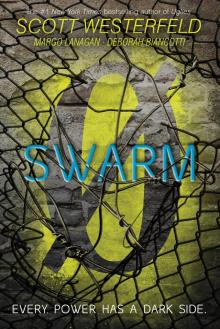 Swarm
Swarm Pretties
Pretties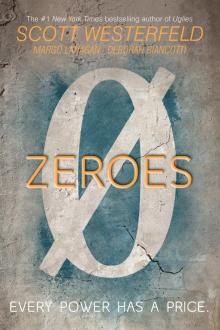 Zeroes
Zeroes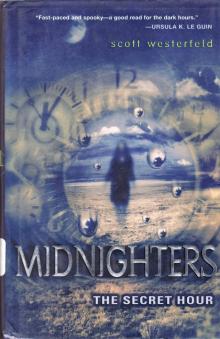 The Secret Hour
The Secret Hour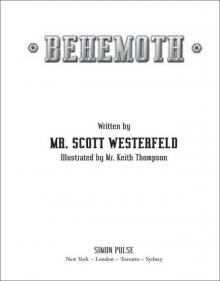 Behemoth
Behemoth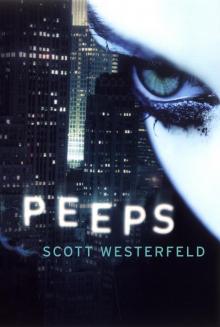 Peeps
Peeps Specials
Specials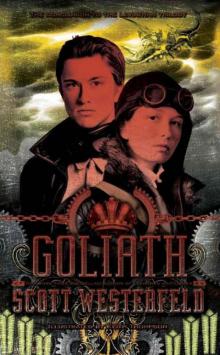 Goliath
Goliath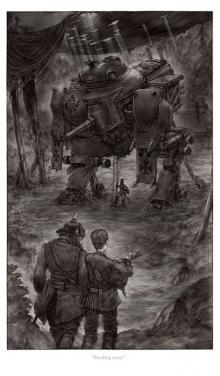 Leviathan
Leviathan Extras
Extras Shatter City
Shatter City The Risen Empire
The Risen Empire Touching Darkness
Touching Darkness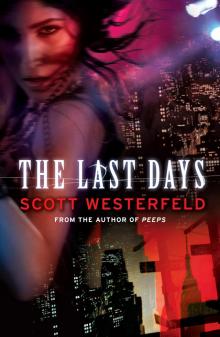 The Last Days
The Last Days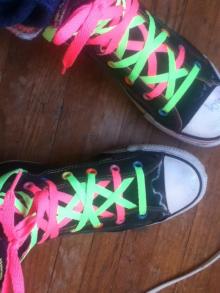 So Yesterday
So Yesterday The Killing of Worlds
The Killing of Worlds Afterworlds
Afterworlds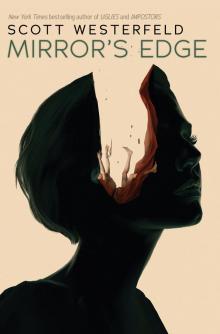 Mirror's Edge
Mirror's Edge Evolution's Darling
Evolution's Darling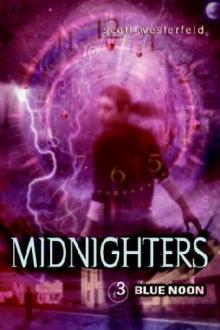 Blue Noon m-3
Blue Noon m-3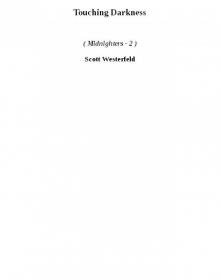 Touching Darkness m-2
Touching Darkness m-2 Impostors
Impostors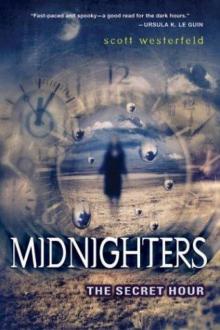 The Secret Hour m-1
The Secret Hour m-1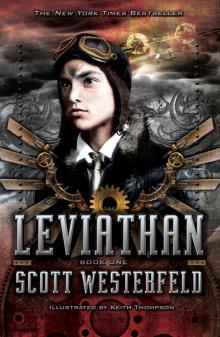 Leviathan 01 - Leviathan
Leviathan 01 - Leviathan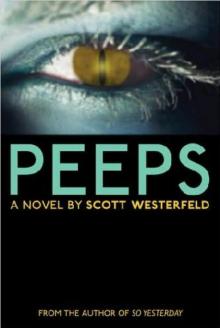 Peeps p-1
Peeps p-1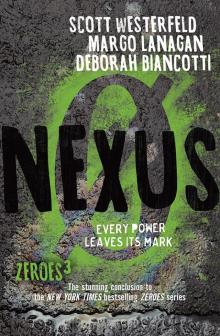 Nexus
Nexus Horizon
Horizon Bogus to Bubbly
Bogus to Bubbly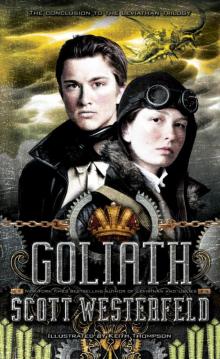 Goliath l-3
Goliath l-3 The Last Days p-2
The Last Days p-2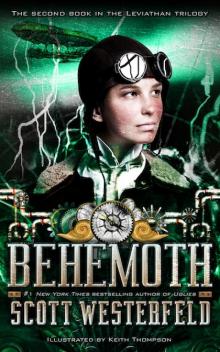 Behemoth l-2
Behemoth l-2 Stupid Perfect World
Stupid Perfect World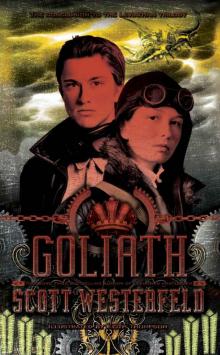 Goliath (Leviathan Trilogy)
Goliath (Leviathan Trilogy)